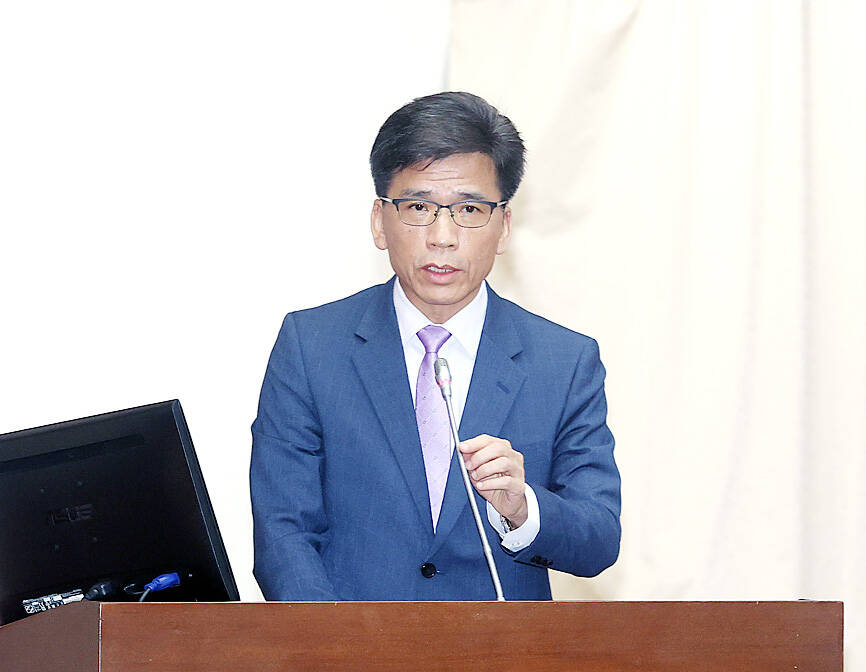Overseas investment would remain capped at 45 percent of local insurers’ total assets, as there are scant investment tools at home and potentially significant losses from sudden divestments, the Financial Supervisory Commission (FSC) said yesterday.
The commission’s comments came in response to a legislator’s concern over the effect of a proposed revision to the Insurance Act (保險法) to lower the upper limit to 25 percent.
The revision was proposed by Chinese Nationalist Party (KMT) Legislator Lo Ming-tsai (羅明才).

Photo: CNA
The proposed 25 percent cap is even lower than the 35 percent implemented before 2007. About 17 years ago, the legislature raised the upper limit to 45 percent.
“The FSC keeps a conservative attitude about such adjustments,” FSC Chairman Peng Jin-lung (彭金隆) said at a meeting of the legislature’s Finance Committee in Taipei.
“In our view, it will be more practical for [insurance companies] to manage businesses if such changes are not made,” he said.
About NT$9 trillion (US$275.8 billion) of overseas assets would have to be allocated back home if the upper limit were lowered to 25 percent, Peng said.
As many of the overseas investments, about 70 to 80 percent, are in foreign bonds, which deliver long-term and stable returns, insurers would incur massive losses if they were forced to sell at a discount before they mature, he said.
In addition, insurers would not be able to sell at a premium above par, especially as the US Federal Reserve and other major central banks are expected to cut key interest rates, he said.
Taiwan’s bond market is comparatively small and would not be able to absorb such an influx of funds, Peng said.
It would be difficult to track where the funds went, he said in reply to Democratic Progressive Party Legislator Wu Ping-jui’s (吳秉叡) question about whether a huge inflow of funds would inundate the local housing and stock markets.
“Stocks and real estate are the common targets of insurance companies, as they do not require permission to invest in,” Peng said.
Wu asked central bank Deputy Governor Yen Tzung-ta (嚴宗大) whether a huge inflow of funds in a short period would lead to the appreciation of the New Taiwan dollar.
“That is a question loaded with assumptions,” Yen said.
Taiwan, like many economies that have a current-account surplus, usually encourages insurance and government funds to invest overseas, which is essential to balance the economy, Yen said.

South Korea’s equity benchmark yesterday crossed a new milestone just a month after surpassing the once-unthinkable 5,000 mark as surging global memory demand powers the country’s biggest chipmakers. The KOSPI advanced as much as 2.6 percent to a record 6,123, with Samsung Electronics Co and SK Hynix Inc each gaining more than 2 percent. With the benchmark now up 45 percent this year, South Korea’s stock market capitalization has also moved past France’s, following last month’s overtaking of Germany’s. Long overlooked by foreign funds, despite being undervalued, South Korean stocks have now emerged as clear winners in the global market. The so-called “artificial intelligence

NEW IDENTITY: Known for its software, India has expanded into hardware, with its semiconductor industry growing from US$38bn in 2023 to US$45bn to US$50bn India on Saturday inaugurated its first semiconductor assembly and test facility, a milestone in the government’s push to reduce dependence on foreign chipmakers and stake a claim in a sector dominated by China. Indian Prime Minister Narendra Modi opened US firm Micron Technology Inc’s semiconductor assembly, test and packaging unit in his home state of Gujarat, hailing the “dawn of a new era” for India’s technology ambitions. “When young Indians look back in the future, they will see this decade as the turning point in our tech future,” Modi told the event, which was broadcast on his YouTube channel. The plant would convert

‘SEISMIC SHIFT’: The researcher forecast there would be about 1.1 billion mobile shipments this year, down from 1.26 billion the prior year and erasing years of gains The global smartphone market is expected to contract 12.9 percent this year due to the unprecedented memorychip shortage, marking “a crisis like no other,” researcher International Data Corp (IDC) said. The new forecast, a dramatic revision down from earlier estimates, gives the latest accounting of the ongoing memory crunch that is affecting every corner of the electronics industry. The demand for advanced memory to power artificial intelligence (AI) tasks has drained global supply until well into next year and jeopardizes the business model of many smartphone makers. IDC forecast about 1.1 billion mobile shipments this year, down from 1.26 billion the prior

People stand in a Pokemon store in Tokyo on Thursday. One of the world highest-grossing franchises is celebrated its 30th anniversary yesterday.